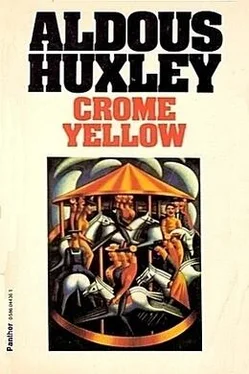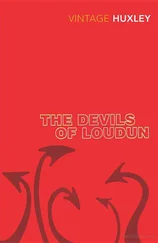For some time past Mary's grave blue eyes had been fixed upon him. "What have you been writing lately?" she asked. It would be nice to have a little literary conversation.
"Oh, verse and prose," said Denis—"just verse and prose."
"Prose?" Mr. Scogan pounced alarmingly on the word. "You've been writing prose?"
"Yes."
"Not a novel?"
"Yes."
"My poor Denis!" exclaimed Mr. Scogan. "What about?"
Denis felt rather uncomfortable. "Oh, about the usual things, you know."
"Of course," Mr. Scogan groaned. "I'll describe the plot for you. Little Percy, the hero, was never good at games, but he was always clever. He passes through the usual public school and the usual university and comes to London, where he lives among the artists. He is bowed down with melancholy thought; he carries the whole weight of the universe upon his shoulders. He writes a novel of dazzling brilliance; he dabbles delicately in Amour and disappears, at the end of the book, into the luminous Future."
Denis blushed scarlet. Mr. Scogan had described the plan of his novel with an accuracy that was appalling. He made an effort to laugh. "You're entirely wrong," he said. "My novel is not in the least like that." It was a heroic lie. Luckily, he reflected, only two chapters were written. He would tear them up that very evening when he unpacked.
Mr. Scogan paid no attention to his denial, but went on: "Why will you young men continue to write about things that are so entirely uninteresting as the mentality of adolescents and artists? Professional anthropologists might find it interesting to turn sometimes from the beliefs of the Blackfellow to the philosophical preoccupations of the undergraduate. But you can't expect an ordinary adult man, like myself, to be much moved by the story of his spiritual troubles. And after all, even in England, even in Germany and Russia, there are more adults than adolescents. As for the artist, he is preoccupied with problems that are so utterly unlike those of the ordinary adult man—problems of pure aesthetics which don't so much as present themselves to people like myself—that a description of his mental processes is as boring to the ordinary reader as a piece of pure mathematics. A serious book about artists regarded as artists is unreadable; and a book about artists regarded as lovers, husbands, dipsomaniacs, heroes, and the like is really not worth writing again. Jean–Christophe is the stock artist of literature, just as Professor Radium of 'Comic Cuts' is its stock man of science."
"I'm sorry to hear I'm as uninteresting as all that," said Gombauld.
"Not at all, my dear Gombauld," Mr. Scogan hastened to explain. "As a lover or a dipsomaniac, I've no doubt of your being a most fascinating specimen. But as a combiner of forms, you must honestly admit it, you're a bore."
"I entirely disagree with you," exclaimed Mary. She was somehow always out of breath when she talked. And her speech was punctuated by little gasps. "I've known a great many artists, and I've always found their mentality very interesting. Especially in Paris. Tschuplitski, for example—I saw a great deal of Tschuplitski in Paris this spring…"
"Ah, but then you're an exception, Mary, you're an exception," said Mr. Scogan. "You are a femme superieure."
A flush of pleasure turned Mary's face into a harvest moon.
Denis woke up next morning to find the sun shining, the sky serene. He decided to wear white flannel trousers—white flannel trousers and a black jacket, with a silk shirt and his new peach–coloured tie. And what shoes? White was the obvious choice, but there was something rather pleasing about the notion of black patent leather. He lay in bed for several minutes considering the problem.
Before he went down—patent leather was his final choice—he looked at himself critically in the glass. His hair might have been more golden, he reflected. As it was, its yellowness had the hint of a greenish tinge in it. But his forehead was good. His forehead made up in height what his chin lacked in prominence. His nose might have been longer, but it would pass. His eyes might have been blue and not green. But his coat was very well cut and, discreetly padded, made him seem robuster than he actually was. His legs, in their white casing, were long and elegant. Satisfied, he descended the stairs. Most of the party had already finished their breakfast. He found himself alone with Jenny.
"I hope you slept well," he said.
"Yes, isn't it lovely?" Jenny replied, giving two rapid little nods. "But we had such awful thunderstorms last week."
Parallel straight lines, Denis reflected, meet only at infinity. He might talk for ever of care–charmer sleep and she of meteorology till the end of time. Did one ever establish contact with anyone? We are all parallel straight lines. Jenny was only a little more parallel than most.
"They are very alarming, these thunderstorms," he said, helping himself to porridge. "Don't you think so? Or are you above being frightened?"
"No. I always go to bed in a storm. One is so much safer lying down."
"Why?"
"Because," said Jenny, making a descriptive gesture, "because lightning goes downwards and not flat ways. When you're lying down you're out of the current."
"That's very ingenious."
"It's true."
There was a silence. Denis finished his porridge and helped himself to bacon. For lack of anything better to say, and because Mr. Scogan's absurd phrase was for some reason running in his head, he turned to Jenny and asked:
"Do you consider yourself a femme superieure?" He had to repeat the question several times before Jenny got the hang of it.
"No," she said, rather indignantly, when at last she heard what Denis was saying. "Certainly not. Has anyone been suggesting that I am?"
"No," said Denis. "Mr. Scogan told Mary she was one."
"Did he?" Jenny lowered her voice. "Shall I tell you what I think of that man? I think he's slightly sinister."
Having made this pronouncement, she entered the ivory tower of her deafness and closed the door. Denis could not induce her to say anything more, could not induce her even to listen. She just smiled at him, smiled and occasionally nodded.
Denis went out on to the terrace to smoke his after–breakfast pipe and to read his morning paper. An hour later, when Anne came down, she found him still reading. By this time he had got to the Court Circular and the Forthcoming Weddings. He got up to meet her as she approached, a Hamadryad in white muslin, across the grass.
"Why, Denis," she exclaimed, "you look perfectly sweet in your white trousers."
Denis was dreadfully taken aback. There was no possible retort. "You speak as though I were a child in a new frock," he said, with a show of irritation.
"But that's how I feel about you, Denis dear."
"Then you oughtn't to."
"But I can't help it. I'm so much older than you."
"I like that," he said. "Four years older."
"And if you do look perfectly sweet in your white trousers, why shouldn't I say so? And why did you put them on, if you didn't think you were going to look sweet in them?"
"Let's go into the garden," said Denis. He was put out; the conversation had taken such a preposterous and unexpected turn. He had planned a very different opening, in which he was to lead off with, "You look adorable this morning," or something of the kind, and she was to answer, "Do I?" and then there was to be a pregnant silence. And now she had got in first with the trousers. It was provoking; his pride was hurt.
That part of the garden that sloped down from the foot of the terrace to the pool had a beauty which did not depend on colour so much as on forms. It was as beautiful by moonlight as in the sun. The silver of water, the dark shapes of yew and ilex trees remained, at all hours and seasons, the dominant features of the scene. It was a landscape in black and white. For colour there was the flower–garden; it lay to one side of the pool, separated from it by a huge Babylonian wall of yews. You passed through a tunnel in the hedge, you opened a wicket in a wall, and you found yourself, startlingly and suddenly, in the world of colour. The July borders blazed and flared under the sun. Within its high brick walls the garden was like a great tank of warmth and perfume and colour.
Читать дальше











